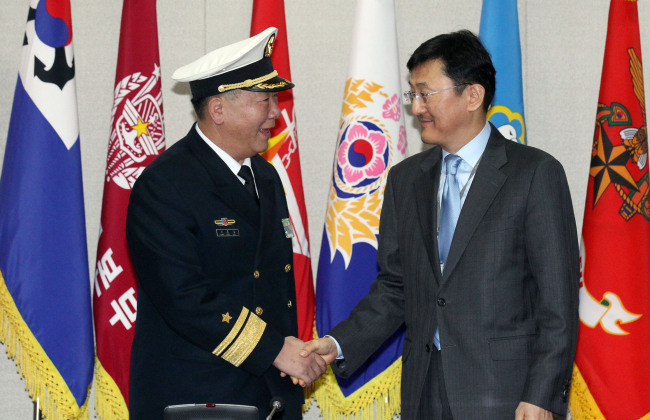Seoul on Friday stepped up its efforts to enlist Beijing’s support for the adoption of stringent sanctions to punish Pyongyang’s recent nuclear test during talks between its senior defense and diplomatic officials and their Chinese counterparts.
Seoul hosted regular working-level defense policy talks with Beijing for the first time since Pyongyang’s purported hydrogen bomb test last Wednesday. During the talks, the Chinese side said it would join a new U.N. Security Council sanctions resolution, which is in the making.
“Beijing said that as North Korea’s nuclear test violated UNSC resolutions and the 2005 joint declaration (of the six party talks), China would participate in the UNSC resolution,” Yoon Soon-gu, director general of the international policy bureau at Seoul’s Defense Ministry, told reporters following his talks with his Chinese counterpart Guan Youfei.
“During the talks, Beijing also said that it has publicly stated that it is absolutely opposed to North Korea’s development of nuclear arms and its nuclear test, and that it delivered such a message when it called in Pyongyang’s ambassador to Beijing,” he added.
 |
| Yoon Soon-gu (right), director general of the international policy bureau at Seoul’s Defense Ministry, shakes hands with his Chinese counterpart Guan Youfei on Friday.(Yonhap) |
Their talks came as Seoul has ratcheted up pressure on Beijing to cooperate in drawing up a new UNSC resolution entailing toughened sanctions so as to curb the growth of Pyongyang’s evolving nuclear program.
China has so far been seen reluctant over the adoption of excessively harsh sanctions against its traditional ally. It has called on Seoul and other countries to exercise “restraint and caution” in responding to the North’s provocation.
China’s stance has appeared different from those of South Korea, the U.S. and Japan, which have vowed to craft “strong, comprehensive and meaningful” sanctions and argued the international community can no longer take a “business-as-usual” approach with the North.
On the previous day, Seoul’s chief nuclear envoy Hwang Joon-kook held talks with his Chinese counterpart Wu Dawei in Beijing. Hwang also pressured his counterpart to support the ongoing efforts to adopt stronger sanctions at the UNSC.
There appeared to be a subtle difference in their positions as Wu reportedly stressed stronger yet “appropriate” sanctions against Pyongyang, while Hwang called for “stronger and comprehensive sanctions.”
“South Korea and China shared the view that the international community should ‘clearly’ respond (to North Korea’s nuclear test) through a UNSC sanctions resolution, and we agreed that we would continue our consultations on the details (of the sanctions),” Hwang told reporters after his talks with Wu.
“We also shared the view that we need to make North Korea recognize that it cannot find an exit out (of its problem) through its nuclear armament, and the view that North Korea should come out to the negotiating table with its denuclearization will and sincere attitude.”
Hwang also met with Li Baodong, China’s vice foreign minister in charge of U.N. affairs.
According to Hwang, Li said China was “actively” reviewing a draft of the UNSC sanctions resolution with a sense of urgency, and that it would closely cooperate with the South to adopt the resolution.
China is viewed as the most crucial player for anti-Pyongyang sanctions, as it wields the greatest influence over the North that is heavily dependent on it for trade and various forms of aid including the supply of oil.
The trade volume between China and the North accounts for more than 90 percent of Pyongyang’s overseas trade. The North is also known to secure 100 percent of its oil from China through a pipeline linking its border city of Sinuiju to Dandong in northeastern China.
By Song Sang-ho (sshluck@heraldcorp.com)

